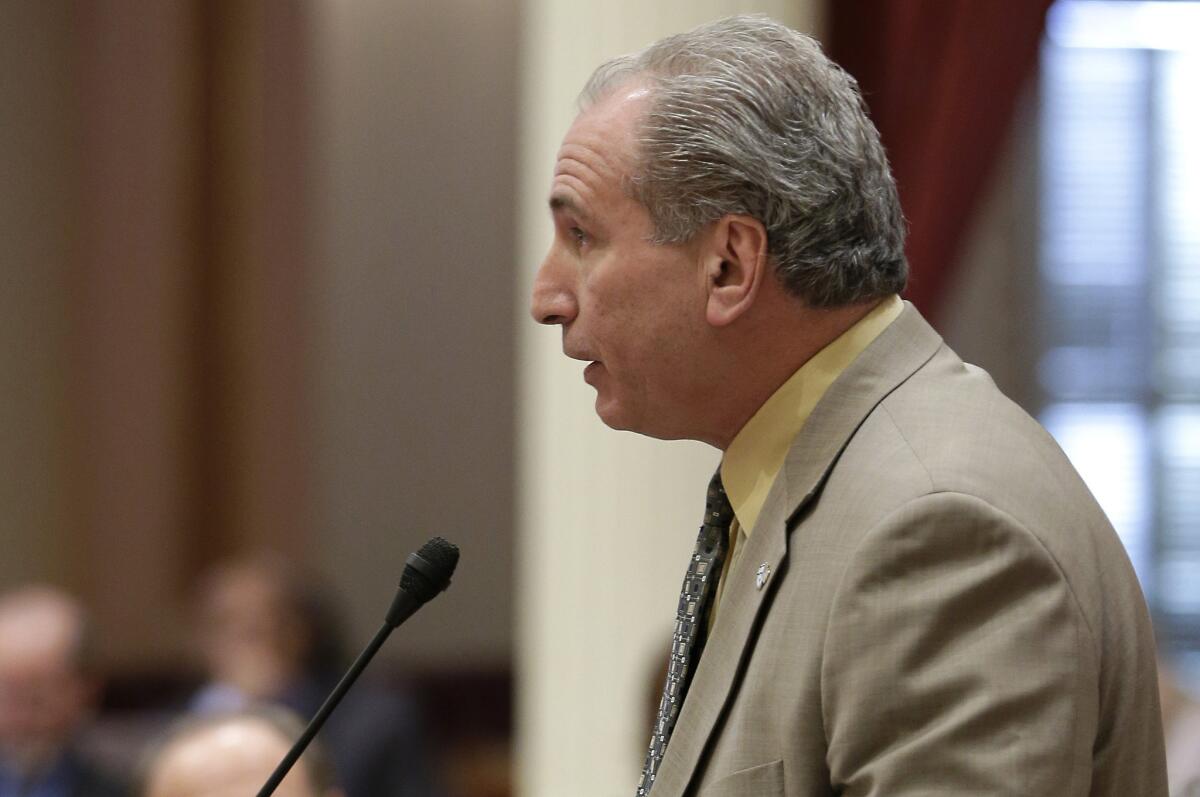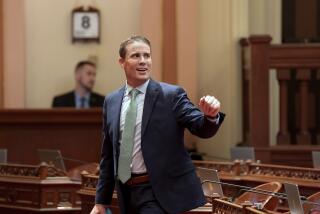Capitol Journal: Tobacco tragedy prompts support of anti-smoking legislation

State Sen. Jeff Stone (R-Murrieta). Stone was the only Republican to vote for the two biggest anti-tobacco bills: One to increase the legal smoking age from 18 to 21, the other to regulate nicotine-laced electronic cigarettes like tobacco.
State Sen. Jeff Stone remembers vividly where he was when he heard that pop singer Nat King Cole had died.
He was on the Santa Ana Freeway in the back seat of his mother’s car, headed from Anaheim to Los Angeles to visit his grandparents. It was Feb. 15, 1965, and he was 9.
“I was alarmed that Nat King Cole had died of cancer from smoking,” the Temecula Republican remembers. “My mom was smoking in the car.
“I said, ‘Mom, Nat King Cole just died of lung cancer. Why are you smoking?’ She said, ‘It’s a very bad habit and I should quit. I’ve tried but I can’t.’”
She eventually quit, but not until 15 years later. She died at 57 after her lung cancer spread to her liver.
Stone, 60, says he has never smoked, although, “I remember trying.”
“In elementary school my best friend Mark and I went to a park and tried to smoke cigarettes. I threw up all over the place. My friend has smoked ever since. He has terrible emphysema.”
Stone, a pharmacist, mentioned the Cole story on the Senate floor last week as lawmakers debated landmark anti-smoking legislation. They passed six bills and sent them to a non-committal Gov. Jerry Brown.
Stone was the only Republican to vote for the two biggest bills: One to increase the legal smoking age from 18 to 21, the other to regulate nicotine-laced electronic cigarettes like tobacco.
“I don’t always vote the party line,” the senator told me. “My constituents come first.”
Stone told his colleagues that tobacco companies spent $9 billion on advertising in 2012 and that 90% of smokers start their addictive habit before 18. By 21, he maintained, they would know more about smoking’s dangers.
And he contended that those cute electronic vapor devices with their yummy flavors are a “gateway” to killer tobacco.
But Stone voted with fellow Republicans against another bill: To allow counties to seek voter approval of a local tobacco tax aimed at discouraging smoking. He says that’s because there was no guarantee the tax revenue would be spent on anti-smoking programs or treatment of tobacco-related ailments.
Bill sponsors contend that each county should decide how to spend its money. But this also gets into practical politics.
Under mind-boggling California law, a local tax that raises money for a specific purpose — such as healthcare — requires a two-thirds vote. If it’s for a general purpose and dumped into one big pot, only a simple majority vote is needed. So counties are leery of tying legal strings to a tax proposal.
Stone also says he would vote against a statewide tobacco tax increase. “That would unfairly punish the poor who are addicted to cigarettes,” he says. “If it’s a choice between food and cigarettes, they’d go with cigarettes.”
That’s logical if the tobacco tax were to be spent for the gamut of government, including schools and jails. But if it’s targeted for anti-smoking programs, healthcare or cancer research — things that help the addicted — a higher tobacco tax makes lots of sense.
There almost certainly will be a hefty tobacco tax proposal on the Nov. 8 ballot.
A broad coalition led by San Francisco billionaire Tom Steyer — the nation’s largest individual campaign donor in 2014 — and including cancer, heart, physician, hospital and union interests is collecting signatures to qualify an initiative for the ballot.
The measure would increase California’s cigarette tax by $2 per pack and raise similar levies on other nicotine products, including e-cigs. The state’s current 87 cents per pack tobacco tax is among the lowest in the nation.
The higher tax would raise up to $1.6 billion annually. Most would be spent on improving government healthcare programs. The rest would be used for anti-smoking education, cancer research and enforcing tobacco laws.
The governor and Senate leader Kevin de León (D-Los Angeles) tried to negotiate a deal with the tobacco lobby to allow the Legislature to pass its own tax increase. Yes, the nicotine peddlers are that powerful in the Capitol, especially among Republicans whose help is needed to raise any tax.
Brown and De León separately suggested the tax hike could be lower than $2 per pack. Perhaps some of the anti-tobacco legislation might be snuffed. The initiative could be scuttled, sparing both sides from spending tens of millions of dollars on a ballot fight.
But the lobbyists insisted on an ironclad guarantee that there wouldn’t be another tax hike attempt for several years, say sources involved in the talks. That assurance was impossible to give. Any citizen can sponsor an initiative.
So the tobacco lobby didn’t bite. Well, yes it did in one way. At least, it barked.
It threatened to drive up the price of qualifying initiatives for the ballot. How? Sponsoring a ballot measure to repeal the anti-smoking bills and paying collectors an astronomical $10 per signature. That would hurt everyone else’s signature collecting, including for the $2 tax.
“You can’t say you were not warned,” reads an e-mail from a tobacco lobbyist to a legislative strategist that was slipped to me.
There are many numbing statistics about smoking deaths. But virtually everyone has seen a close friend, a relative or loved one die early — often miserably — because of nicotine.
Nat King Cole, a heavy smoker, was only 45 when he succumbed. His signature song was “Unforgettable.” That’s certainly what his death was for one Republican lawmaker.
Twitter: @LATimesSkelton
ALSO:
Tobacco industry threatens referendum on smoking bill
21 to smoke? Assembly approves raising smoking age
Steyer donates $1 million to tobacco initiative
More to Read
Get the L.A. Times Politics newsletter
Deeply reported insights into legislation, politics and policy from Sacramento, Washington and beyond. In your inbox three times per week.
You may occasionally receive promotional content from the Los Angeles Times.







